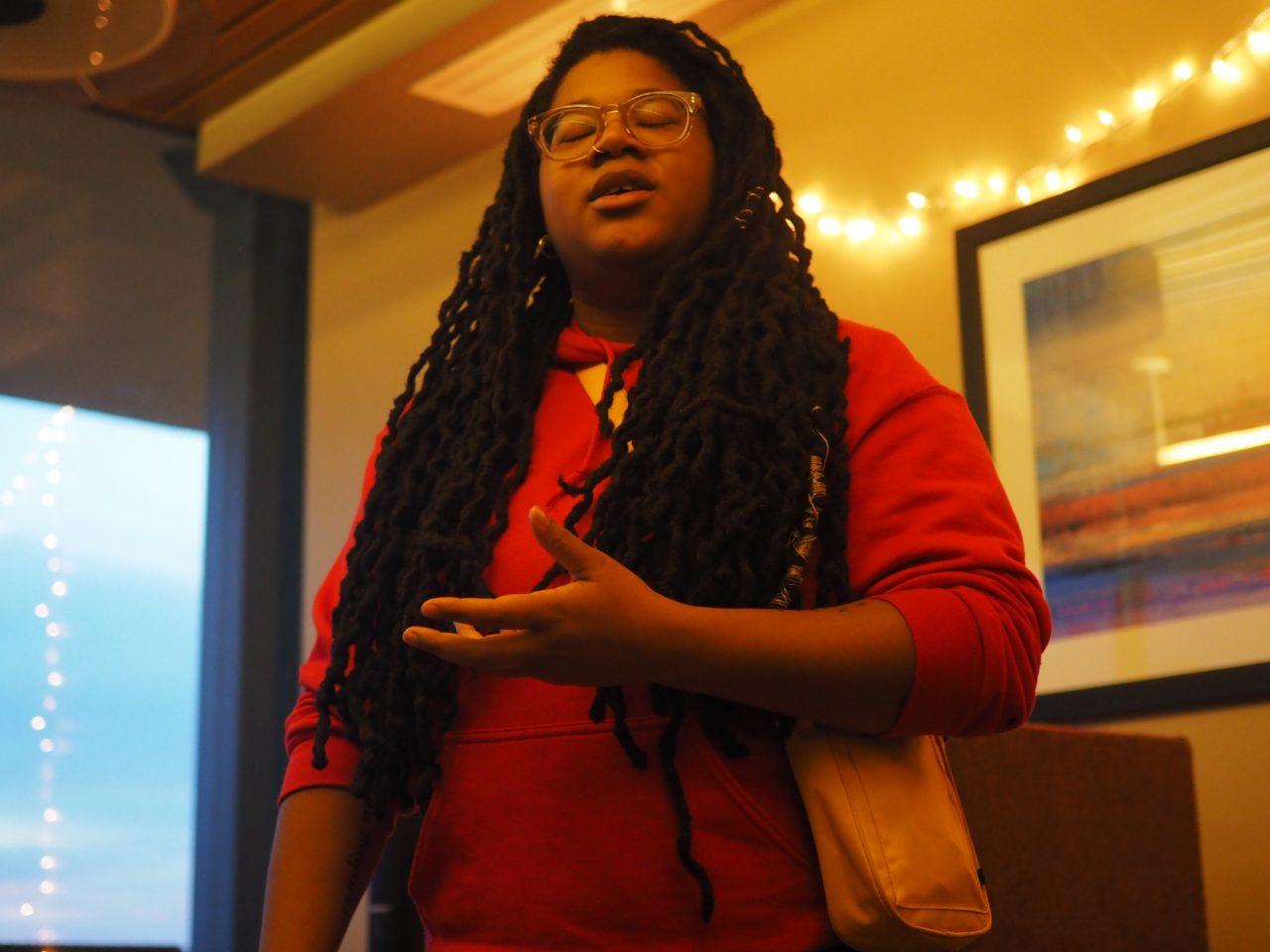Photo by Genevieve Humphreys
“Ain’t I divisive by accident, don’t I complicate the revolution with all my grievances? … Am I not the pulse of every one of your revolts? Ain’t I a woman? Ain’t that a rhetorical question?” asked Kai Davis, Black Student Union’s (BSU) guest spoken word poet, at “A Love Letter to Black Folks,” held in Skyline on Feb. 14 at 6 p.m.
Davis, a writer, performer and teaching artist from Philadelphia, has won several prestigious spoken word poetry awards and is currently the Poetry Editor for Apiary Magazine and Organizer/Artistic Director for the Philly Pigeon. During her 90-minute poetry showcase, hosted by BSU as part of the celebration of Black History Month, Davis spoke about being a queer black woman in an often-hostile world with both levity and heartache.
The evening began with Davis reflecting on a college class in black studies where her professor informed the class that black women would have to put their “petty shit aside” in order to achieve black liberation.
“I [was] arguing with them, and I [was outnumbered], and I [was] just getting angrier and angrier. And then I would go to these women’s studies courses where white women would ask me to put my blackness aside, probably in kinder words, but still for the sake of unity,” Davis recalled as she introduced her poem “Ain’t I A Woman?” — based on Soujourner Truth’s famous speech of the same title — about the unique marginalization that black women face in society.
“When a black man tells me I’m too thick for my own good, when he follows me down the street … when a white girl in my class calls us ‘we,’ speaks of universal need, says woman is the new black … ain’t I a woman?”
Several of Davis’s poems focused on the ostracization of women of color in predominantly white, gentrified spaces and educational institutions.
“The curriculum carries its authors like trinkets. The creators of these texts are raging with color, but the students pick them black and white and rigid. Gloria Anzaldua becomes another sad brown woman. Dubois becomes just another sociologist. I raise my hand to stretch, afraid they will pin me to the whiteboard by my palm, make me a martyr for every angry black woman,” Davis sr, reading from her poem ‘Tip of Tongue.’
Other poems spoke on the legacy of ancestral trauma in the black community, as well as how black girls and women who are killed by police officers are often forgotten.
“I tell myself I don’t have space in my throat, right? Another name? But I do. America hands me a black boy’s name and tells me to repeat it loud. And I do,” Davis recited. “I say ‘India Kager,’ and it is flat and awkward. I learned black girls should go quietly. My brothers been knew that. Know the revolution always came in fragments.”
Davis also spoke about the nuances of her identity as a queer black woman. She connected loving other black women to liberatory praxis in the vein of black lesbian poet Audre Lorde in a poem inspired by and named for Lorde’s essay, “The Erotic As Power.”
“Being a queer black woman is both a privilege and an obligation to not distinguish between loving myself and loving you, touching myself and touching you. This is more than just physical: this is spiritual, ancestral and political. If we kiss, it’s a protest. If we fuck, it’s a revolution. If we fall in love, it’s divinity, it is righteous and it is beautiful,” Davis recited.
Davis ended the evening with one of her earliest poems, which she wrote when she was 17, entitled “Fuck I Look Like?” The poem interrogated the double standard that people of color in educational systems are often held to by both white classmates and their own peers.
“That’s how I grew up in a way,” said Briahn Hawkins, junior and member of BSU. “[Because of] the way that I would talk, the things that I was involved with, the way that I acted, a lot of people from my family were just like, ‘Oh you talk like a white girl, you act like a white girl, why are you so white?’… So, yeah, I would have to say that ‘Fuck I Look Like?’ was my favorite poem out of all of them.”
Junior Kezia Nyarko, member of BSU, originally recommended Davis perform at Trinity during Black History Month after watching some of Davis’s earlier poetry videos.
“I think [Davis’s poetry] was really powerful, and I feel like a lot of people connected with it regardless of whether or not they could identify with her identities,” Nyarko said.
Davis’s poetry book, “Ain’t I,” can be bought online on Blurb or by visiting her official website at kaidavispoetry.com.







